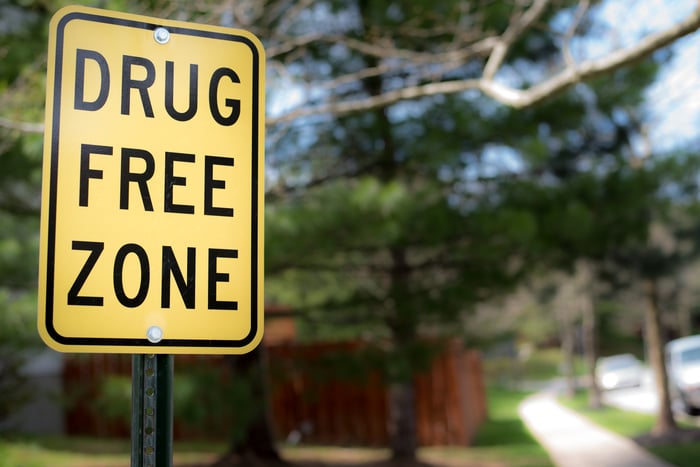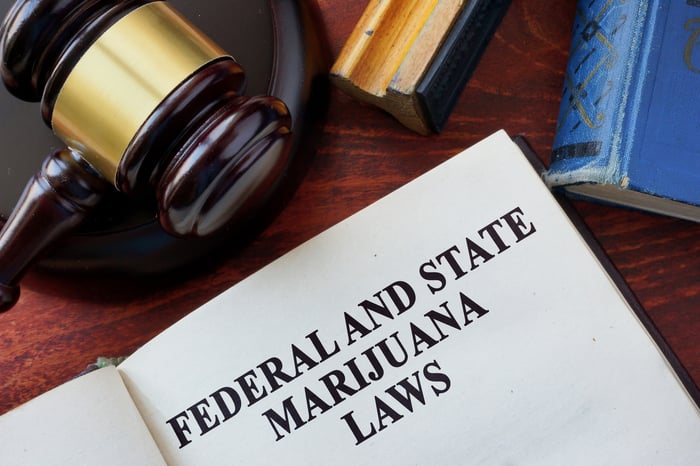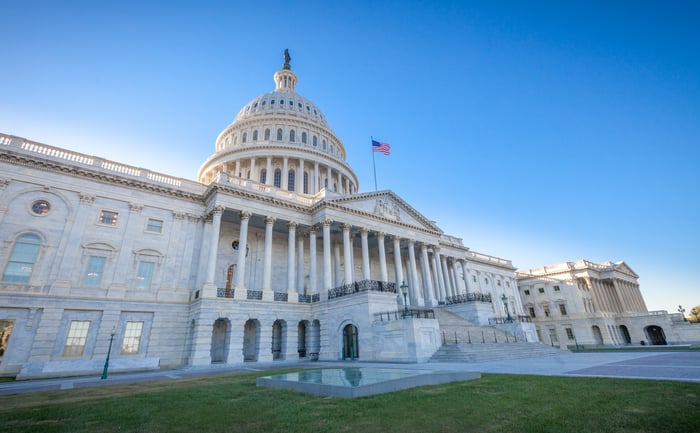When discussing the fastest growing industries in North America, legal marijuana is likely to enter the conversation. According to cannabis research firm ArcView, in partnership with BDS Analytics, the North American weed industry could grow by 28% annually through 2021. That means sales will have soared from less than $7 billion to almost $25 billion between 2016 and 2021.
It's also an industry that's grown in popularity among the public in a relatively short period of time. Back in 1995, national pollster Gallup found that only 25% of respondents were in favor of legalizing marijuana nationally. However, by October 2017, Gallup's survey showed that nearly two-thirds of the American public now supported legalizing pot.

Image source: Getty Images.
The U.S. weed industry is stuck in neutral
Yet, within the United States, the marijuana industry is stuck in the proverbial mud. Sporting a Schedule I classification, marijuana is entirely illegal, highly prone to abuse, and isn't recognized as having any medical benefits. Even though around three-fifths of all states have legalized cannabis in some capacity, federal law still supersedes these states.
This scheduling has negative impacts for the marijuana industry and patients, too, which is why most investors have kept their distance from the U.S. cannabis industry. For example, most financial institutions want absolutely nothing to do with marijuana-based businesses since, under a strict interpretation of federal law, any assistance could be construed as money laundering, resulting in fines and/or criminal charges.
What's more, U.S. tax code 280E is a nightmare for U.S.-based pot companies. This more than three-decade-old tax rule disallows marijuana companies from taking normal corporate income-tax deductions, leaving those businesses that are profitable to pay an effective tax rate of up to 90%. This constricts the ability of pot businesses to hire and expand.
And let's not forget that the red tape surrounding medical cannabis research makes running clinical trials almost impossible.

Image source: Getty Images.
The reason cannabis remains a Schedule I drug
Take a look around the globe and you'll see a burgeoning cannabis industry. Countries throughout Europe have opened their doors to medicinal cannabis, while our neighbor to the north, Canada, appears to be on the verge of legalizing recreational weed by this summer. Should Canada follow through, it'd be only the second country in the world (behind Uruguay) to OK the sale of adult-use cannabis.
Meanwhile, in the U.S. marijuana is going nowhere, primarily as a result of Republicans in Congress. Polls have consistently shown that the GOP has a more unfavorable view of cannabis than folks who identify as Democrat or Independent. Since Republicans currently have a majority in the legislative branch of the federal government, cannabis is making absolutely no progress on Capitol Hill.
Furthermore, Attorney General Jeff Sessions is waging war on the pot industry. Having previously stated that "good people don't smoke marijuana," Sessions has also suggested that cannabis is a reason for, not a solution for, the opioid epidemic.
Earlier this year, Sessions took it to the U.S. marijuana industry by announcing the rescinding of the Cole memo. Created by former Deputy Attorney General James Cole during the Obama administration, the Cole memo outlined a series of loose rules that legalized states would abide by in order to keep the federal government at bay. These rules included keeping adolescents away from marijuana, as well as keeping grown cannabis within a state. Sessions, who felt the Cole memo overstepped its bounds, is now allowing state-level prosecutors the discretion of bringing charges against businesses or individuals that violate the Controlled Substances Act.

Image source: Getty Images.
This former House Speaker now supports descheduling marijuana
Yet, not all Republicans have the same view of marijuana as Sessions. In fact, one influential Republican, who once stated that he was "unalterably opposed" to decriminalizing marijuana, has now changed his tune.
Former House Speaker John Boehner, who served as House Speaker between 2011 and 2015, and was a GOP representative for Ohio for 24 years between 1991 and 2015, is now fully behind the idea of decriminalizing cannabis and supporting medical research. Boehner sent out the following tweet early in the morning on Wednesday, April 11, announcing that he'd be joining the board of advisors for Acreage Holdings because his "thinking on cannabis has evolved."
I'm joining the board of #AcreageHoldings because my thinking on cannabis has evolved. I'm convinced de-scheduling the drug is needed so we can do research, help our veterans, and reverse the opioid epidemic ravaging our communities. @AcreageCannabis https://t.co/f5i9KcQD0W
— John Boehner (@SpeakerBoehner) April 11, 2018
In a statement to CNBC, Boehner went on to say that, "like that of millions of other Americans, [my thinking on cannabis] has evolved as I've learned more about the issue. I decided to get involved because of the struggles of our country's veterans and the opioid epidemic, after learning how descheduling the drug can potentially help with both crises. He continued, "Descheduling will reduce the conflict between federal policy and state programs."
Interestingly enough, Boehner's comments come just a week after two separate studies published in JAMA Internal Medicine found a correlation between medical marijuana use and a lessening of opioid prescriptions written. While both studies are mere correlations at this point and not concrete findings, they do suggest additional research is needed to see if access to medical cannabis could lessen the opioid crisis, which claims an estimated 115 Americans a day via overdose-related deaths.

Image source: Getty Images.
Change remains unlikely anytime soon
However, even with Boehner in the corner of cannabis enthusiasts, change remains unlikely anytime soon. Though it does signal that even the staunchest opponents of cannabis can change their minds, Sessions seems unlikely to allow state-level expansion to continue unhindered.
We also can't discount the fact that President Trump, who once stated that he was "100 percent" behind medical marijuana during his campaign, hasn't exactly placed his support in cannabis's corner. In fact, earlier this year Israel announced that it was shelving plans to export medical cannabis to the U.S. in order to appease President Trump.
It's not out of the question that Congress changes its mind on marijuana at some point in the future, especially with support from the public gaining steam. But, change seems unlikely as long as Trump is president and Sessions remains attorney general. That's a cue for investors to keep their distance.



